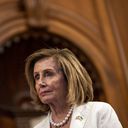China's threats shouldn't stop Pelosi from visiting Taiwan, analysts in Taiwan say

TAIPEI, Taiwan — Threats from China shouldn't stop U.S. House Speaker Nancy Pelosi from visiting Taiwan, analysts on the self-governing island say.
Why it matters: The news of Pelosi's potential trip to Taiwan has sparked heated rhetoric from Beijing and concerns among Biden administration officials that the dispute could spiral into a cross-strait crisis.
Catch up quick: The Chinese foreign ministry said China would take "forceful measures" if the visit occurs and communicated privately to the U.S. that a military response was possible, the Financial Times reported.
- President Biden, meanwhile, said the U.S. military thinks such a trip is "not a good idea right now."
- Pelosi, who has not confirmed the trip, said last week that she believes "it’s important for us to show support for Taiwan." It would be the first visit by a House speaker to Taiwan since Newt Gingrich traveled there in 1997.
- "Inviting members of the U.S. Congress to visit Taiwan has long been a focus of MOFA and the Taipei Economic and Cultural Representative Office in the United States," Taiwan Ministry of Foreign Affairs (MOFA) spokesperson Joanne Ou told Axios in a statement, adding that the ministry had not received any "definite information" from the U.S. regarding the visit.
What they're saying: In Taiwan, analysts and policymakers have welcomed news of Pelosi's possible trip.
- "It would be a very positive step forward in building up our relationships, not just with the Speaker but overall with Congress, and a symbol of how strong the US-Taiwan relationship is," said Vincent Chao, who previously served as director of the political division at the Taipei Economic and Cultural Representative Office, Taiwan's de facto embassy in Washington, D.C.
Others have warned that heeding Beijing's threats would only be counterproductive.
- "Fear of Chinese retaliation should not dictate engagements between partners," said Enoch Wu, founder of the Taipei-based security and defense think tank Forward Alliance and former staffer at Taiwan's national security council.
- "We learned from Munich ’38 that appeasement never satisfies the appeased," he told Axios, paraphrasing a quote by former Estonian President Toomas Hendrik Ilves. The 1938 Munich Agreement allowed Nazi Germany to annex part of Czechoslovakia, in a bid to satisfy Germany's expansionist ambitions and prevent the outbreak of war.
The big picture: The Chinese government has recently stepped up its pressure on Taiwan.
- Beijing has already more than doubled its incursions into air space near Taiwan over the past year, Wu said.
- "China’s militarization of the South China Sea, its crackdown on peaceful protests, and persistent interference in elections around the world are crossing red lines – not friendly visits between two democratic countries," he added.
- "Taiwan must continue to expect and prepare for Chinese belligerence, even without visits from US officials."
Between the lines: The news of Pelosi's potential visit comes at a sensitive time for China, as the ruling Chinese Communist Party is preparing for a national Party congress held only once every five year.
- Each Party congress is usually accompanied by months of extra restrictions on media, society and the government as a whole, as party officials aim to create the appearance of a unified and successfully governed country before the congress begins.
- This year's meeting is especially sensitive and has come with even more restrictions and propaganda, as it is expected to pave the way for Chinese President Xi Jinping to assume a precedent-defying third term.
- Though Taiwan is self-governed, Chinese officials view the visit of a high-ranking U.S. government official there as an unacceptable breach of territorial sovereignty — and a highly public reminder that the Party has yet to make good on its promise to annex the island.
Yes, but: "When it comes to China’s pressure over Taiwan’s engagement in the international space, there’s never a good time. And that’s by design," Chao told Axios.
- "The Chinese have a vested interest at this point in potentially increasing the risk and cost of high level interaction between Taiwan and the U.S," he said.
Go deeper: As Taiwan's profile rises, so does risk of conflict with China
Editor's note: This story has been updated to clarify that Enoch Wu was paraphrasing former Estonian President Toomas Hendrik Ilves when he referenced Munich '38.